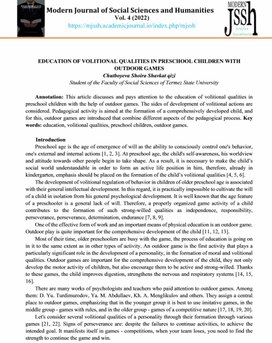EDUCATION OF VOLITIONAL QUALITIES IN PRESCHOOL CHILDREN WITH OUTDOOR GAMES

EDUCATION OF VOLITIONAL QUALITIES IN PRESCHOOL CHILDREN WITH OUTDOOR GAMES
Chutboyeva Shoira Shavkat qizi
Student of the Faculty of Social Sciences of Termez State University
Annotation: This article discusses and pays attention to the education of volitional qualities in preschool children with the help of outdoor games. The sides of development of volitional actions are considered. Pedagogical activity is aimed at the formation of a comprehensively developed child, and for this, outdoor games are introduced that combine different aspects of the pedagogical process. Key words: education, volitional qualities, preschool children, outdoor games.
Introduction
Preschool age is the age of emergence of will as the ability to consciously control one's behavior, one's external and internal actions [1, 2, 3]. At preschool age, the child's self-awareness, his worldview and attitude towards other people begin to take shape. As a result, it is necessary to make the child’s social world understandable in order to form an active life position in him, therefore, already in kindergarten, emphasis should be placed on the formation of the child’s volitional qualities [4, 5, 6].

The development of volitional regulation of behavior in children of older
preschool age is associated with their general intellectual development. In
this regard, it is practically impossible to cultivate the will of a child in
isolation from his general psychological development. It is well known that the
age feature of a preschooler is a general lack of will. Therefore, a properly
organized game activity of a child contributes to the formation of such
strong-willed qualities as independence, responsibility, perseverance,
perseverance, determination, endurance [7, 8, 9].
One of the effective form of work and an important means of physical education is an outdoor game. Outdoor play is quite important for the comprehensive development of the child [11, 12, 13].
Most of their time, older preschoolers are busy with the game, the process of education is going on in it to the same extent as in other types of activity. An outdoor game is the first activity that plays a particularly significant role in the development of a personality, in the formation of moral and volitional qualities. Outdoor games are important for the comprehensive development of the child, they not only develop the motor activity of children, but also encourage them to be active and strong-willed. Thanks to these games, the child improves digestion, strengthens the nervous and respiratory systems [14, 15, 16].
There are many works of psychologists and teachers who paid attention to outdoor games. Among them: D. Yu. Turdimurodov, Ya. M. Abdullaev, Kh. A. Menglikulov and others. They assign a central place to outdoor games, emphasizing that in the younger group it is best to use imitative games, in the middle group - games with rules, and in the older group - games of a competitive nature [17, 18, 19, 20].
Let's consider several volitional qualities of a personality through their formation through various games [21, 22]. Signs of perseverance are: despite the failures to continue activities, to achieve the intended goal. It manifests itself in games - competitions, when your team loses, you need to find the strength to continue the game and win.
Signs of perseverance are: the desire to bring the work begun to the end, the ability to continue activities if they do not want to do it or if more interesting activities arise. For example, in physical exercises, a good result cannot be achieved immediately, a long workout is needed.
Signs of decisiveness are: quick and deliberate decision-making in the process of activity, the implementation of the decision made confidently, the absence of confusion.
In order to form the volitional qualities of a person in the process of playing activity, a study was conducted on the basis of a budgetary preschool educational institution in the city of Termez, Surkhandarya region. There are 15 children in the group. The children were offered the game "Drag and drop in pairs". The players were divided into two teams and lined up near the middle line, one team facing the other. The players firmly grasped the right hand, the left hand was on the belt or behind the back.
On a signal, the participants pulled the players of the other team over the line behind their backs. The game continued until then. Until all the players were pulled in one direction or another. The team that manages to win wins.
The analysis is carried out according to the scheme:
1. Is the child able to achieve the goals set by adults.
2. Knows how to independently set a goal and be guided by it.
3. Does the child know how to restrain his emotions.
4. What volitional qualities are formed in the child:
1) perseverance - shows the desire to achieve the necessary.
2) responsibility - independently sets a goal and achieves a result.
3) perseverance - shows a desire to bring the work begun to the end, to continue activities with an unwillingness to engage in it.
4) endurance - shows the ability to suppress emotional reactions.
5) decisiveness - boldly makes a decision.
6) independence - able to act without outside help.
7) discipline - the child obeys the social rules of behavior.
1. High - the child independently sets a goal, knows how to restrain his emotions. The child has formed such strong-willed qualities as independence, perseverance, discipline, endurance, determination, responsibility and perseverance.
2. Average level - the child sets a goal on his own, but is not guided by it in activities, does not know how to keep emotions under control. The child has formed only some volitional qualities: responsibility, endurance and independence.
3. Low level - the child does not know how to independently set a goal and be guided by it, does not know how to restrain his emotions. The child cannot control his emotions until the end.
Conclusion. According to the results of the study, it can be concluded that 1 (6.6%) child showed a high level of formation of volitional manifestations. 5 (34%) children have an average level and 9 (59.4%) children have a low level. This level is not critical, if the teacher and parents deal with the child, the situation will be corrected. Thus, only in close cooperation between the preschool educational institution and the parents of pupils, it will be possible to form volitional qualities in children of preschool age in outdoor games. References
1. Alikulovich, M. K. (2022). Methodology for Carrying out Swimming Training Lessons for Children 9-10 Years Old. International Journal of Discoveries and Innovations in Applied Sciences, 2(2), 36–38.
2. Менгликулов Х. А. (2020). Особенности физической подготовки специалистов физической культуры в высшем учебном заведении. Педагогика ва психологияда инновациялар, 11(3).
3. Menglikulov, Khairulla (2021). Features of organization of general physical preparation in lesson and extracurricular activities," Mental Enlightenment Scientific-Methodological Journal: Vol. 2021 : Iss. 2 , Article 6.
4. Alikulovich, M. K., & Yuldashevich, T. D. (2020). Development of physical training skills and formation of willpower qualities in extracurricular activities. European Journal of Research and Reflection in Educational Sciences Vol, 8(3).
5. Менглиқулов, Х. А. (2021). Мактабда жисмоний тарбиянинг дарсдан ташқари фаолиятини ташкиллаштириш ва унинг шакллари. Актуальные научные исследования в современном мире,
3(9 (77)), 104-107.
6. Alikulovich, M. K. (2022). Mobile Games on the Water as a Means of Developing the Physical Qualities of School Children. European Multidisciplinary Journal of Modern Science, 4, 783–786.
7. Alikulovich, M. K. (2022). Method of developing speed-strength qualities in young swimmers 12-14 years. Modern Journal of Social Sciences and Humanities, 4, 179–182.
8. Yuldashevich , T. D. (2022). Innovative technologies in the process of formation of will qualities. Modern Journal of Social Sciences and Humanities, 4, 95–98.
9. Абдуллаев Я. М., Турдимуродов Д.Й. Создание педагогических условий в формировании волевых качеств у учеников начальных классов / Я. М. Абдуллаев, Д. Ю. Турдимуродов // Colloquium-journal. –2020. –№ 24-2(76). –С. 14-16.
10. Mahkamovich, A. Y. (2022). Innovative Approaches to the Formation of the Voluntary Qualities of Students-Athletes. International Journal of Discoveries and Innovations in Applied Sciences, 2(2), 17–20.
11. Abdullaev, Y. (2021). Forms and methods of developing the use of folk movement games in high school students. Mental Enlightenment Scientific-Methodological Journal, 2021(2), 73-79.
12. Abdullaev Yashnarzhon Makhkamovich. (2021). Physical education of senior schools by means of folk moving games. European Scholar Journal, 2(11), 70-72.
13. Abdullayev Yashnarjon Mahkamovich. (2022). Technology of using outdoor games in the development of physical qualities of junior schoolchildren. Academicia Globe: Inderscience Research, 3(04), 516–520.
14. Mahkamovich, A. Y. (2022). Mobile games for school children. Modern Journal of Social Sciences and Humanities, 4, 202–205.
15. Абдуллаев, Я. М., & Турдимуродов, Д. Й. (2020). Ўсмир ёшдаги ўқувчиларда иродавий сифатларни жисмоний тарбия воситалари орқали ривожлантириш. Современное образование (Узбекистан) , (9 (94)), 56-62.
16. Abdullayev Yashnarjon Mahkamovich. (2022). Technology of using outdoor games in the development of physical qualities of junior schoolchildren. Academicia Globe: Inderscience Research, 3(04), 516–520.
17. Абдуллаев, Я. М., & Юлдaшeвич, Т. Д. (2020). Coздaниe пeдaгoгичecких уcлoвий в фopмиpoвaнии вoлeвых кaчecтв у учeникoв нaчaльных клaccoв. In Colloquium-journal (№24(76)). Голопристанський міськрайонний центр зайнятості.
18. Турдимуродов, Д. Й. (2021). Возможности средств физического воспитания в формировании волевых качеств у школьников/ДЙ Турдимуродов. Инновации в педагогике и психологии.-2021, 7, 74-80.
19. Turdimurodov, D. Y. (2021). Testing volitional qualities for students of high schools of secondary school. The American Journal of Social Science and Education Innovations, 3(03), 405-413.
20. Dilmurod Yuldashevich Turdimurodov. (2021). Preschool period: pedagogical aspect of education of will in a child. Current research journal of pedagogics, 2(09), 47–51.
21. Turdimurodov, D. Y. (2021). Willed qualities of a personality and ways of their formation in sport. ISJ Theoretical & Applied Science, 12(104), 689-692.
22. Турдимуродов, Д. Й. (2021). Ўқувчиларнинг иродавий сифатларини шакллантиришда жисмоний тарбия воситаларининг имкониятлари. Инновации в педагогике и психологии, 4(7).
- 📁 Алфавит
© ООО «Знанио»
С вами с 2009 года.
![]()

